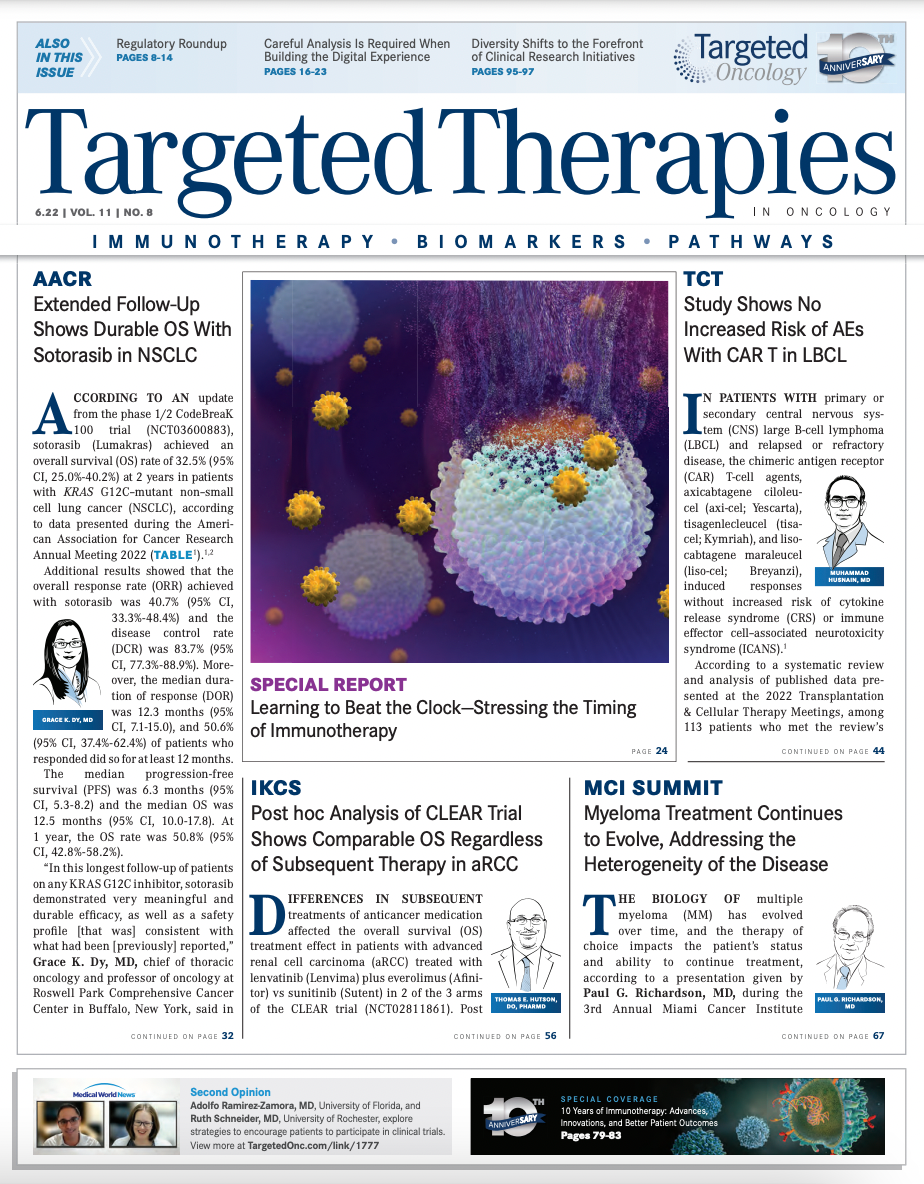Minimal Difference in Efficacy Shown for Immunotherapy Combos in Poor-Performance Metastatic RCC
Following a study of frontline pembrolizumab plus axitinib or nivolumab plus ipilimumab in patients with metastatic renal cell carcinoma, investigators recommended that prospective real-world studies are needed to confirm the results.

Patients with renal cell carcinoma (RCC) with poor performance status did not demonstrate significant differences in efficacy based on receiving frontline pembrolizumab (Keytruda) plus axitinib (Inlyta) or nivolumab (Opdivo) plus ipilimumab (Yervoy), according to results of a retrospective study presented at the 2022 International Kidney Cancer Symposium: Europe in Antwerp, Belgium.1
No significant differences were found between the 2 regimens in terms of overall response rate (ORR), overall survival (OS), and progression-free survival (PFS) for patients with an ECOG performance score of 2 or greater. The retrospective analysis also identified a correlation between lung immune prognostic index (LIPI) and ORR, PFS, and OS among these patients with poor prognosis.
Pembrolizumab plus axitinib and nivolumab plus ipilimumab have been approved by the FDA for first-line treatment of advanced or metastatic RCC based on the KEYNOTE-426 (NCT02853331) and CheckMate 214 (NCT02231749) trials, respectively.2,3 However, both studies only enrolled patients with a Karnofsky performance status of 70% or greater, equivalent to an ECOG performance score of 0 or 1, so the outcomes for higher-risk patients are unknown.
The retrospective analysis identified 70 patients across 14 institutions, 45 of whom were treated with nivolumab/ipilimumab and 25 of whom were treated with pembrolizumab/axitinib.1 There were 45 patients (64%) with poor-risk disease based on International Metastatic RCC Database Consortium criteria and 25 (36%) withvintermediate-risk disease. The median age ofvpatients at diagnosis was 63 years, and 51 (73%) were male. Seventeen patients (24%) had prior nephrectomy, and 50 (71%) had synchronous metastatic disease at diagnosis.
At the time of analysis, at a median followup of 11.1 months, the ORR for patients who received pembrolizumab/axitinib was 42% vs only 23% for those who received nivolumab/ipilimumab, but this difference was not statistically significant (P = .379). The combined ORR for all patients was 31%. The disease control rate for pembrolizumab/axitinib vs nivolumab/ipilimumab was 63% vs 43% (P = .319), respectively.
The median PFS for those receiving pembrolizumab/ axitinib was 6.0 months vs 3.8 months with nivolumab/ipilimumab (P = .842); this was also not statistically significant. Median PFS across both subgroups was 5.4 months.
At the time of follow-up, 41% of patients had died. Median OS was not reached for the pembrolizumab/axitinib group vs 9.8 months for the nivolumab/ipilimumab group (P = .286). Median OS across both groups was 16 months.
The rate of grade 3 or higher treatment-related adverse events was also assessed. The incidence rate was 20% with pembrolizumab/axitinib vs 25% with nivolumab/ipilimumab, showing no signifi cant difference in toxicity (P = 1.0).
However, LIPI status did show significant associations with effi cacy outcomes. Of the 42 patients who were able to be evaluated for LIPI, 20 patients (48%) had good LIPI scores, 15 (36%) had an intermediate LIPI score, and 7 (17%) had a poor LIPI score. LIPI was associated with ORR (P = .045). IPI was significantly associated with ORR (P = 0.045) and with PFS (poor hazard ratio [HR], 7.6; P < .001; intermediate HR, 2.7; P = .018) and OS (poor/intermediate HR, 3.5; P = .016).
In their conclusion, the investigators recommended that prospective real-world studies are needed to confirm these results.
REFERENCES:
1. Carril-Ajuria L, Colomba E, Romero-Ferreiro C, et al. Efficacy of frontline combination therapy in metastatic renal cell carcinoma (mRCC) patients (pts) with poor performance status (PS). Presented at: 2022 International Kidney Cancer Symposium: Europe; April 22-24, 2022; Antwerp, Belgium.
2. FDA approves pembrolizumab plus axitinib for advanced renal cell carcinoma. FDA. Updated April 22, 2019. Accessed May 20, 2022. https://bit.ly/3wv1Csa
3. FDA approves nivolumab plus ipilimumab combination for intermediate or poor-risk advanced renal cell carcinoma. FDA. Updated April 16, 2018. Accessed May 20, 2022. https://bit.ly/3yJJpZo

Enhancing Precision in Immunotherapy: CD8 PET-Avidity in RCC
March 1st 2024In this episode of Emerging Experts, Peter Zang, MD, highlights research on baseline CD8 lymph node avidity with 89-Zr-crefmirlimab for the treatment of patients with metastatic renal cell carcinoma and response to immunotherapy.
Listen